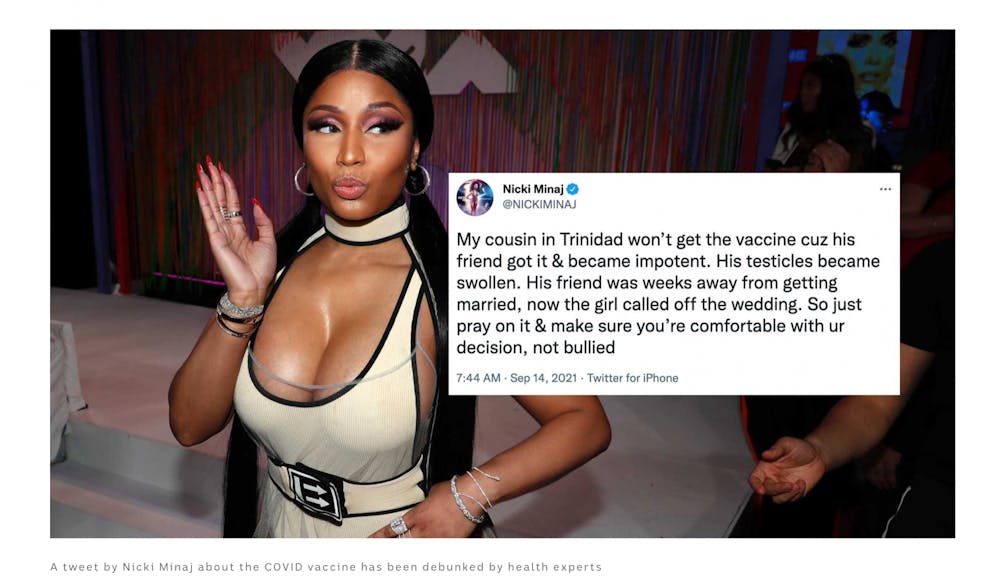If you’re an avid Twitter user, like myself, then your timeline may have been flooded with content about Nicki Minaj and her opinions about the COVID-19 vaccine ––what some people are calling #BallGate–– for the past few weeks. While the incident is quite ridiculous from start to finish, the power and influence that celebrities have should be taken seriously, especially in the context of the COVID-19 pandemic.
For those who don’t know much about the situation, here is a quick rundown:
On Sep. 13, Nicki Minaj, one of the most famous female rappers in the world, tweeted about her hesitance surrounding getting the COVID-19 vaccine because of a health incident that allegedly occurred with her cousin’s friend in Trinidad. She also stated that she would not be attending Vogue’s annual Met Gala, which happened that same day, because of the vaccine requirement that came with the ticket.
Within the next two days, the Health Minister of Trinidad and Tobago held a press conference to deny Minaj’s claims and she was contacted by the White House who offered to discuss concerns about the vaccine with her.
While these responses may seem excessive, it is not irrational for people to display concern over the situation. As of today, Minaj has almost 23 million followers on Twitter, and her fandom known as the “Barbz,” are notoriously known for their loyalty. Her tweets are not merely something to turn into a meme, they have real-life consequences on the public and public health at large.
Many of Minaj’s fans were upset about her tweets. One fan posted, “As a barb, [people] have every right to be upset about how careless it is to tweet something like this when over 3 million [people] across the world have died from [COVID-19].” Some took to the replies of her tweets to urge her to get vaccinated, assuring her that it was safe.
However, some reacted differently. On Sep. 15, fans gathered outside of the Centers for Disease Control and Prevention (CDC) headquarters in Atlanta, Georgia, as a result of Minaj’s tweets. The group chanted, “You know Fauci’s lying,” and “Down with the CDC.”
Minaj isn’t the only celebrity who has voiced their suspicions over the vaccine. At a concert in June 2021, rapper Busta Rhymes took to the stage and said, “COVID can suck a d***. All these little weird a** government policies and mandates [can] suck a d***.” Even members of the NBA ––including Kyrie Irving, point guard for the Brooklyn Nets–– have shared their reluctance about getting vaccinated.
As celebrity culture becomes increasingly prevalent in our society, it can become dangerous when they are viewed as authority figures by their fans. Oftentimes, individuals begin to take their admiration for a celebrity’s talents and contributions to an extreme level. Appreciation transforms into idolization and fans will pledge their allegiance to celebrities at any cost. This is what “stan culture”— a term you may have heard on the internet —encompasses. It’s when the obsessive behavior of fans leads to stalking, verbal attacks, and even threats of violence.
It is not surprising that so many people have centered their lives around public or celebrity figure. The presence of celebrities is everywhere; when we turn on the television, open our social media accounts, even when we go to purchase groceries, we can’t walk through the aisles without seeing the faces of a dozen celebrities across tabloids and magazines.
It is important that we find a way to appreciate the work of celebrities without placing them on a pedestal. You can be a fan of Nicki Minaj and enjoy her music, while simultaneously criticizing her harmful decisions —such as spreading misinformation about the vaccine on such a huge platform.
It isn’t just on the individual to combat celebrity culture, the celebrities in question should also be putting in the effort. It is necessary that they hold themselves accountable when they have caused harm. Furthermore, celebrities should use their platforms for the greater good, especially during a crucial time like the pandemic. A number of celebrities have endorsed the COVID-19 vaccine, like basketball legend Kareem Abdul Jabbar and country star Dolly Parton. When celebrities show their fan bases —which consist of people from various backgrounds— that they trust the vaccine and respect COVID-19 health protocols, their fans will often follow suit.
So, the next time a celebrity voices something controversial, we should take a second to pause and think critically about the situation before drafting tweets and making jokes about it. The more aware we are of the public influence celebrities have and the more we hold them accountable, the less likely we are to fall into the trap of celebrity culture and idolization.
It is valid to have concerns about the COVID-19 vaccine. In the span of fewer than two years, we have been thrown into a pandemic, asked to fully change our lifestyles, and receive a vaccination which many seem wary of. However, in a time like ours, it is important to listen to the wisdom of health professionals. Please take care of yourself and your community by getting vaccinated: https://www.vaccines.gov/.



